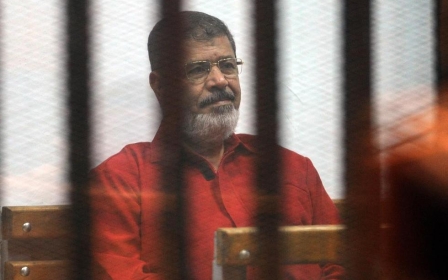UK announces 'step change' in approach to Egyptian human rights

The UK government has announced a "step change" in its relationship with Egypt over growing concerns about human rights abuses in the country.
The move coincides with the adding of the country to the list of the Human Rights Priority Countries, despite previous criticisms by the foreign affairs select committee over the government's apparent indifference to Egyptian abuses.
In its Human Right Priority Update report released on Thursday, the foreign office said the human rights situation had continued to "deteriorate" in Egypt.
"We raised our concerns regarding human rights in Egypt in our national statements at the UN Human Rights Council (HRC) sessions in March and June," read the statement.
"During the June session we took the decision to raise Egypt under agenda item 4 (human rights situations that require the HRC’s attention).
"In previous HRCs, we had raised our concerns regarding Egypt in our national statement under the Agenda Item for the Report of the UN High Commissioner for Human Rights (item 2). Our decision to raise Egypt under item 4 represented a step-change in our approach, commensurate with our growing concern."
The apparent change in tone stands in stark contrast with remarks made by the foreign affairs select committee in April, when it warned the government's approach to human rights advocacy in a number of countries, highlighting Egypt and Saudi Arabia, “seemed to be more about box-ticking than genuine consultation”.
Changing the guard
Up until April, the UK has primarily focused on economic investment and issues relating to regional security when dealing with Abdel Fatah al-Sisi's government. The governent has experienced an overhaul after the June EU referendum, with Theresa May installed as the new prime minister.
Her new foreign secretary, Boris Johnson, on Tuesday stated there was a "burgeoning crisis" in Egypt. Some commentators have suggested that Johnson was confusing Egypt with Turkey in its post-coup instability.
“We have very serious issues before us today we have an unfolding humanitarian crisis in Syria that is getting worse. We have a crisis in Yemen that is intractable and a burgeoning crisis on Egypt, and those are to my mind far more important than any obiter dicta you may have disinterred from 30 years of journalism," he said in a heated excahnge with an American journalist who had taken him to task over his comments referring to US President Barack Obama's "part-Kenyan" ancestry.
According to the MailOnline, the FCO later said that Johnson had intended to say Egypt, although there was no elaboration on what "crisis" he was referring to in that case.
An FCO spokesperson told MEE that the designation of Egypt as Human Rights Priority Country came "in light of the deterioration in the human rights situation in 2015."
“The “step-change” referred to in the report was the decision we took to raise Egypt at the UN Human Rights Council session in June," said the spokesperson. "This decision is commensurate with our growing concern over the human rights situation in Egypt. New funding has been approved for projects to support human rights in Egypt and work will begin soon.”
The spokesperson also confirmed that Johnson had been referring to Egypt, adding that the "challenges facing the country and the wider region are well known."
Human rights organisation Reprieve welcome the apparent change in attitude.
"Clearly there is a real massive evidence of repression going on in Egypt and it might be that the balance has tipped and it's become a bit too much for the UK to stand by and tolerate," said spokeswoman Alice Gillham.
She told MEE that in past the UK's approach had apparently been to press the Egyptian government to reform without much public condemnation of their actions.
"The UK is working quite closely with the Egyptian government on this stuff and that's something that we seen I think in our correspondence with the UK government - that they've said while they've got human rights concerns they've also been working quite closely with the government on a reform agenda," she said.
"This latest update is quite interesting because there's less of that language there and now they're saying 'we're putting Egypt on the agenda at the human rights council'.
"So clear there's been a shift from the start of the year."
Egypt has been in a state of flux since a military coup overthrew the democratically elected government of Mohamed Morsi in July 2013 and torture, disappearences and extra-judicial killings have been on the rise in Egypt.
A number of foreign nationals have languished in prison and have been a point of focus for human rights organisations. Reprieve has repeatedly raised the case of Ibrahim Halawa, an Irish citizen arrested in 2013 during a demonstration in Cairo.
The case of Giulio Regini, an Italian student murdered in Cairo in January 2016, has also led to calls for greater scrutiny of the practices of the Egyptian government, which some have held responsible for the student's death in custody.
"A local NGO documented reports of 676 cases of torture and 137 deaths in detention," said the FCO in its report.
"The National Council for Human Rights submitted a list of 191 alleged forced disappearances to the Ministry of the Interior, which responded that 99 of those on the list were in detention and 15 had been released."
Stay informed with MEE's newsletters
Sign up to get the latest alerts, insights and analysis, starting with Turkey Unpacked
Middle East Eye delivers independent and unrivalled coverage and analysis of the Middle East, North Africa and beyond. To learn more about republishing this content and the associated fees, please fill out this form. More about MEE can be found here.




